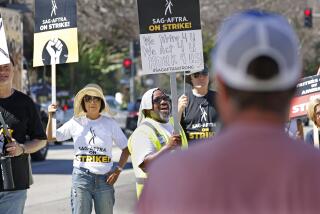Ronald W. Haughton, 88; Mediated Labor Disputes
- Share via
Ronald W. Haughton, a noted labor mediator whose long career included mediating a dispute between the United Farm Workers and a major California grape grower in the 1960s and serving as chairman of the Federal Labor Relations Authority during the air-traffic controllers’ strike in the 1980s, has died. He was 88.
Haughton died July 4 of complications from a stroke at his home in Palm Harbor, Fla., his family said.
Known as a consensus builder, he arbitrated 4,000 cases during a career that began in the early 1940s with the War Labor Board in Washington, D.C., and continued into his 80s as a private mediator.
Haughton, who co-directed the joint Institute of Labor and Industrial Relations at the University of Michigan and Wayne State University in Detroit from 1956 to 1979, was frequently tapped to help settle disputes.
During the 1960s, President Johnson asked him to help mediate the racial integration of employees at Liggett & Meyers Tobacco Co. In addition, California Gov. Edmund G. “Pat” Brown appointed Haughton to help resolve problems between farmworkers and Di Giorgio Corp., a major grape grower.
With Haughton’s help, a long-sought agreement for a union representation election at the Di Giorgio ranch near the Kern County town of Arvin was reached. When it was announced in October 1966, Brown called the pact a “historic agreement.”
A month later, United Farm Workers head Cesar Chavez announced that Di Giorgio and the union would arbitrate their first contract for field workers beginning Dec. 1, with Haughton serving as one of two men conducting arbitration.
In 1970, Haughton was recruited by Theodore W. Kheel, New York City’s chief labor mediator, to organize Mayor John V. Lindsay’s new Board of Mediation for Community Disputes.
In 1979, at the request of President Carter, Haughton became head of the new three-member Federal Labor Relations Authority.
After thousands of members of the Professional Air Traffic Controllers Organization went on strike during contract negotiations with the government in 1981, President Reagan fired them for refusing to return to work. In the panel’s vote to cancel the union’s rights to be the exclusive bargaining agent for the controllers, Haughton was the lone dissenter. Strikes by federal employees are illegal.
In offering his minority opinion, Haughton said he would prefer to send the issue back to the authority’s law judge if the union acted within five days to end the strike. He said he wanted the judge to hear more evidence and make a final recommendation for a remedy.
But if the union did not call off the strike by his deadline, Haughton warned, he would concur with his two colleagues in decertifying the organization.
Attempting to improve its case for a reversal of the panel’s ruling stripping it of its status, the union said it was ready to end its strike when the government “ends its lockout.”
But a government spokesman said the union’s action did not change the administration’s position that the striking controllers would not be taken back.
A week later, Haughton switched his vote, making it a 3-0 vote for decertification.
Born in Toronto in 1916, he spent much of his childhood in Seattle. He received his bachelor’s degree from the University of Washington in 1937 and his master’s from the University of Wisconsin a year later.
After World War II, he served as assistant to the director of the U.S. Conciliation Service and then as assistant director of the Institute of Industrial Relations at UC Berkeley.
From 1950 to 1955, he was the impartial arbitrator for Ford Motor Co. and the United Automobile Workers.
Haughton is survived by his wife of 53 years, Anne; daughters Jan Tracy of Safety Harbor, Fla., Patty Haughton of Wilmington, Del., and Leslie Zemsky of Buffalo, N.Y.; son John of Millersville, Md.; and 13 grandchildren.
More to Read
Inside the business of entertainment
The Wide Shot brings you news, analysis and insights on everything from streaming wars to production — and what it all means for the future.
You may occasionally receive promotional content from the Los Angeles Times.










